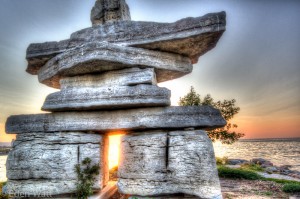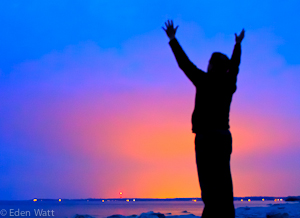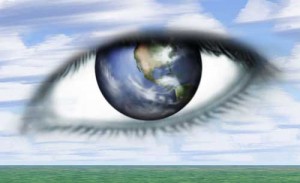What is “happy” and is it really attainable? In this age of fast-paced, information overload, what do we really want from life?
I believe we want what people have always wanted. We want to be happy. We want to love and contribute to others. We want to be loved. We want to think we’re making a difference, that there’s a “reason” or purpose for our existence.
While some might argue that happy is an overused term and not a practical goal, let’s consider happy as being peaceful and content, as being the opposite of miserable, as being empowered to be all that we can be in life, to be able to have loving and sustainable relationships. And then, I think, everyone will agree that this is a state where we would all like to be centered. 
Based on my own personal exploration into this essential quest, I’ve summarized what I view as the Top Ten tips to a Happy Life, as taught by many of the thought leaders today who are great authors, speakers, and spiritual teachers..
TOP TEN:
1. Be Present, Be Here Now
Studies suggest we have somewhere between 12,000 to 65,000 thoughts per day, although I’ve seen reference to a wider range (between 2,000 to 600,000!). Most commonly, 50-60,000 is considered a good estimate.
Being human means being inundated with thoughts all day, every day: endless observations, judgements, interpretations, complaints, worries, ‘what-ifs’, memories, regrets, wishes, desires, dreams about our future, anger about our past, and on and on. I’ve seen statistics indicating 95% of them are similar from day to day. Some thoughts seem completely random, others can hijack us as we follow a thread and let our emotions react to what are sometimes completely irrational, twisted versions of reality. For me, it has been a major breakthrough to understand that I am NOT my thoughts. For too long, my thoughts ran me. They still try to, every single day, but I am watching them now. I used to look to my thoughts for meaning, wondering why I was suddenly upset when nothing had happened.
So how much of an average person’s thoughts are rooted in the present moment? Some suggest that the majority of our thoughts are rooted in the past (somewhere between 70 and 90%) with about 10-20% ruminating or dreaming or imagining what will happen in the future. A small percentage of our thoughts actually focus on the present moment in a purely experiential manner. Within our minds, our perception of the past, how it is affecting us now and into the future can often become warped.
Eckhart Tolle, author of “The Power of Now” and “A New Earth” and other books is a well-known speaker and teacher in this area. Tolle tells us: “Stay fully present in the now-your whole life unfolds here. In the now there is joy of Being and deep peace”.
In Deepak Chopra’s “Seven Spiritual Laws of Success”, he says that pure potentiality is pure consciousness, the field of all possibilities and infinite creativity. Meditation to connect with our inner being to be present and master our thoughts can help us to find that state of pure consciousness.
2. Your Thoughts Create your Reality
When you start to understand that you are not your thoughts, that you are a being with a powerful inner spirit that happens to also have a brain that does what brains do, non-stop generation of thoughts, you can step back and observe this and take control. Consider how you can choose how your brain operates just as you make these decisions about using your arm or your fingers or your eyes every day of your life.
The realization that you actually could control and direct your thoughts to create whatever reality you choose can open up a whole new world. If, for example, you tell yourself that you cannot succeed at something – then you probably won’t. So, the obvious question is why tell yourself that? And yet we do it all the time..
There’s so much groundbreaking work in this area over the past decade, everything from the books on the Law of Attraction (including the blockbuster work called “The Secret”) and new science indicating that thoughts are actually bits of quantum energy (see my post entitled “The Science behind the Mystery”), which opens up even more unbelievable implications for our potential capabilities if we can master our mind.
Louise Hay (founder of Hay House) is an inspiring example of this powerful concept in action. Her countless books and CD’s on Affirmations show how you can change your life by the very simple practice of constantly generating positive, life-affirming thoughts. From “Power Thoughts” by Louise Hay: “Trust life to hear and respond to your positive words. Say these affirmations every day and your whole world will change for the better.”
3. Be Grateful
Expressing gratitude, especially if you can make it a daily practice to declare everything you are grateful for in your life, can create positive self-affirming thoughts instead of negative ones and align your attention to everything that is good in your life. This alone can be transformational. Many current thought leaders and spiritual teachers encourage people to keep a gratitude journal.
If you do a search on Gratitude quotations, you will find many empowering thoughts. Here’s a few:
“I would maintain that thanks are the highest form of thought; and that gratitude is happiness doubled by wonder.” G.K. Chesterton
“God gave you a gift of 86,400 seconds today. Have you used one to say ‘thank you?’ ” William A. Ward
“If the only prayer you said in your whole life was, ‘thank you’, that would suffice.” Meister Eckhart
4. Trust that the universe is unfolding as it should..
 Or perhaps an easier way to say this is, Have Faith. Sometimes in our darkest hours, when nothing seems to be going as we had wanted or expected, we can’t see this. We want only to fight against what is. Everything will not always go our way but, if you trust life and let it unfold, as Mick Jagger said, “you just might get what you need”.
Or perhaps an easier way to say this is, Have Faith. Sometimes in our darkest hours, when nothing seems to be going as we had wanted or expected, we can’t see this. We want only to fight against what is. Everything will not always go our way but, if you trust life and let it unfold, as Mick Jagger said, “you just might get what you need”.
For some this could mean a belief in God, aligned with one of the great faith traditions, for others it might just mean knowing that there is a greater life force, that we are all a part of it, and that life will take us where we need to go if we surrender to it.
5. Practice Forgiveness
Oprah and others, have defined Forgiveness as recognizing that you can’t change the past. We hold onto a lot of resentment and in the end, who does it hurt? We hurt ourselves more than anyone else. Accepting what has happened and creating the space to move on can be a powerful step forward.
Sometimes, particularly if you have been a victim of crime or abuse, whatever happened may seem ‘unforgiveable’. In these cases, remember that forgiveness does not mean you have to let that person back into your life but it can release you from the hold that this has on you.
In other cases, we may have imagined transgressions that were in reality, minor. Caroline Myss, medical intuitive and author of a number of bestselling books including “Sacred Contracts”, outlines the common archetypes that drive our behaviours. She identifies the “Victim” as one of the four archetypes for survival which can lead you to believe that “you are always taken advantage of and it’s never your fault.” If this feels familiar, her work may be of interest.
Regardless of the situation (and many may lie in between these two extremes), if you have anger or bitterness in your heart, you must do the work needed (whatever that is for you) to let it go. It literally will suck the life out of you and can affect all your relationships. The serenity prayer from AA says it all: “God, grant me the serenity to accept the things I cannot change, Courage to change the things I can, And wisdom to know the difference.”
6. Follow your Bliss
One of Joseph Campbell’s famous quotations…
Many will say that they would love to follow their bliss but they have to pay the bills, don’t have time, it’s too late to change course, or any other number of excuses.
I would contend that for many of us, we don’t really know what our ‘bliss’ is. Of course, it seems like it must be the greener grass on the other side. Certainly, the idea of walking away from a tough job and living in luxury seems blissful – but this is not what Campbell intended.
Sometimes we need to take a hard look at our life circumstances and make adjustments along our journey. The important thing is to be conscious. Make conscious choices. Embrace work that you love. Remember, even when you’re “following your bliss”, there will be tough sledding at times. This is certainly not a free ticket to quit.
7. Choose your Life
This is another perspective on “Follow your Bliss”. Sometimes, it’s not our outside circumstances that need to change but our interior dimension.
I took a course called the Landmark Forum many years ago, and this was a key concept after three long days of workshop. It correlates back to the idea that ‘your thoughts create your reality’.
When you declare that your life, your spouse, your children, your job, your world are all exactly what you always wanted, then they will become that for you.
8. Don’t take yourself too seriously
Or, put another way: “Get over yourself”.
No one likes criticism and we all have fragile egos… but sometimes, when our thoughts hijack us, we can turn the simplest comments into conspiracy theories.
The truth is that not everything is about you, sometimes when people scowl at you, it’s because they’re unhappy inside. If a person says something to you that you don’t like, you don’t have to react in kind. In fact you may be able trigger transformation in another by not letting your ego take over, instead be present with that person and be compassionate.
Deepak Chopra asserts that “… the ego is not who we really are. The ego is our social mask, it is the role we are playing.”
If you are aware and present with people, not coloured by past injustices or imagined indignities, then you can choose to always have powerful, meaningful conversations.
Not being driven by ego takes focus, commitment, and courage…
9. We are all one
When you take steps to be present, become committed to not ‘be your ego’ or run by your thoughts, to be grateful for the people in your life, and to create your reality then you will start to sense more and more that you are not alone but a part of something much greater, the collective spirit of humanity.
Even the latest scientific breakthroughs with respect to quantum consciousness and unified field theory are demonstrating that the universe and everything in it, ourselves included, are interconnected by a vast field of energy.
In this collective space, love and contribution become natural which in turn can fuel harmony and peace in your life.
10. Conscious Evolution
Last year, I took the Evolutionary Worldview Course through Enlightennext Magazine and Andrew Cohen and later, watched the event: “A Call to Conscious Evolution, Our Moment of Choice” which was also hosted by this group. Both experiences were inspirational and eye-opening. As Deepak, one of the many renowned speakers at the Evolutionary Leaders’ event, said: “… the only way to transform the world is to transform yourself..” and “… even well-meaning activism is often coming from a place of outrage rather that creative consciousness..”
This jives with many of the teachings of Andrew Cohen and his team with respect to the evolution of our interior dimension and our culture. Our mind, our being, or our “interior dimension” as they call it have evolved just as our bodies have. They talk about 4 billion years of evolution on this planet and how we, as sentient, powerful beings, can now choose where we go from here. They ask questions like: “how does your own evolution come into the culture, into changing the world?” and “To what degree are you enabling this process of evolution through your own heroic efforts?” so that we can leave the world a better place because we were here.
Making conscious decisions everyday to feed and exercise your body for optimal health and well-being is the other side of the coin to choosing the thoughts that you feed yourself for optimal mental health and well-being.


 I don’t think it’s relevant to debate the specific insights or progressions as Redfield saw them in order to gain some insight into these ideas. Redfield’s Celestine books raised awareness for mysterious coincidences, human prayer-energy, channelling thoughts into a collective, dynamic force, and evolving towards a spiritual culture on Earth.
I don’t think it’s relevant to debate the specific insights or progressions as Redfield saw them in order to gain some insight into these ideas. Redfield’s Celestine books raised awareness for mysterious coincidences, human prayer-energy, channelling thoughts into a collective, dynamic force, and evolving towards a spiritual culture on Earth.



